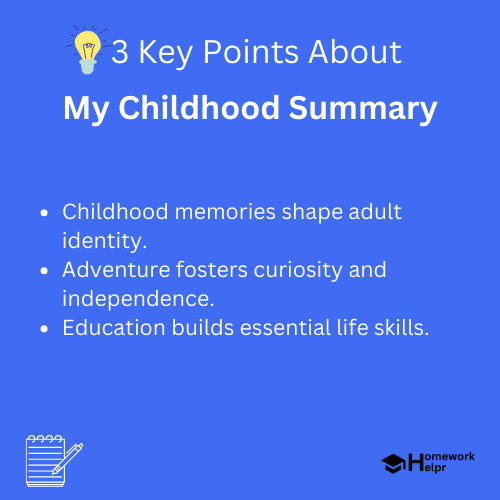📝 Summary
Childhood is a precious stage characterized by laughter, learning, and exploration. It’s a time of creating memories that shape our identity and build our personalities. During playtime, friendships thrive and creativity flourishes, setting the groundwork for social skills and resilience. Adventure is intrinsic to childhood, with every day presenting new quests that foster curiosity and independence. As we reflect on our childhood experiences, it becomes clear that each moment plays a significant role in our personal growth and development.Embrace these formative years, as they craft who we become.
My Childhood: A Journey Through Innocence and Discovery
Childhood is one of the most precious stages of life, filled with laughter, learning, and the exploration of the world. It’s a time when everything seems magical and even the simplest things bring immense joy. This article will delve into the various aspects of childhood, including memories, experiences, and the lessons learned along the way.
The Importance of Memories
Memories from childhood are like treasures that shape who we become as adults. These memories can range from family vacations to special occasions, all playing a crucial role in our personality development. They help us understand our roots and contribute to our overall identity.
Some of the most vivid memories revolve around playtime, where friendships were formed and creativity flourished. Whether it was playing tag in the park or building forts in our living rooms, these experiences created bonds that often last a lifetime.

Adventure and Exploration
Childhood is synonymous with adventure. Every day felt like a new quest waiting to be explored. The world was full of mysteries, and our imagination was the key to unlock them. From climbing trees to searching for hidden treasures, every activity was an opportunity to discover something new.
- Nature Hikes: Exploring the woods and observing wildlife.
- Seashell Collecting: A trip to the beach became a treasure hunt.
- Science Experiments: Mixing household items to see reactions.
These adventures taught us valuable lessons about curiosity and the importance of asking questions. They encouraged us to become independent thinkers and problem solvers.
Definition
Curiosity: A strong desire to learn or know something. Independent Thinkers: Individuals who form their judgments and opinions autonomously.
Learning Through Play
One of the greatest aspects of childhood is learning through play. Children often acquire new skills and knowledge without even realizing it. Playing games, solving puzzles, and engaging in sports help enhance cognitive functions and develop social skills.
For instance, when children play board games, they learn about strategy and critical thinking. Similarly, team sports teach cooperation and the spirit of teamwork. These are essential skills that aid in personal and professional success later in life.
Examples
Example 1: Playing chess teaches kids strategy and foresight. Example 2: Participating in soccer helps children learn teamwork and discipline.
Family and Community Influence
Family plays a significant role during childhood. Families not only provide love and support but also contribute to a child’s first social interactions. Celebrating holidays and family traditions teaches essential values and cultural significance.
Community involvement is also vital. Engaging with neighbors, participating in local events, and visiting community centers foster a sense of belonging. These experiences instill the importance of friendship and cooperation within a broader social context.
❓Did You Know?
Did you know that studies show that children who engage in community activities tend to develop better social skills and emotional intelligence?
Challenges and Resilience
While childhood is often associated with joyous moments, it can also bring challenges. Facing fears, overcoming obstacles, and dealing with disappointments are all part of growing up. These experiences, although difficult, are essential for building resilience.
For example, not winning a game or facing challenges at school can be discouraging. However, these situations teach us how to deal with failure and emerge stronger. The ability to cope with challenges is a vital skill that benefits individuals throughout their lives.
Definition
Resilience: The capacity to recover quickly from difficulties; toughness. Failure: Lack of success in achieving goals or objectives.
Education: The Bedrock of Childhood
Education during childhood sets the foundation for future learning and development. Early education introduces children to a world of knowledge and curiosity. Schools play a critical role in nurturing creative thinking and helping children discover their passions.
From literacy to numeracy, basic subjects are essential for cognitive development. But education extends beyond academics. Life skills such as communication, time management, and emotional awareness are also cultivated in school settings.
Examples
Example 1: Learning to read opens up a world of possibilities. Example 2: Group projects help enhance teamwork and collaboration.
Reflection and Growth
Looking back at childhood allows for reflection on personal growth. The time spent playing, learning, and overcoming challenges shaped who we are today. Each experience, whether good or bad, contributed to a richer understanding of life and human behavior.
As we move through life, the childhood memories we cherish become guiding lights when faced with difficulties. They remind us of our potential and the joy that life can bring.
Conclusion
Childhood is a beautiful tapestry woven from a myriad of experiences, emotions, and adventures. The memories we create, the lessons we learn, and the friendships we forge during these formative years are truly invaluable. Reflecting on my childhood reminds me that every moment, good or bad, was significant in shaping my identity.
As you journey through your own childhood, cherish these moments and the lessons they bring. Embrace adventure, learn through play, and remember that both the joyous and challenging experiences contribute to a fulfilling life.
Related Questions on My Childhood Summary
What role do memories play in childhood?
Answer: They shape our identity and personality.
How does play contribute to learning?
Answer: Kids acquire skills without realizing it.
Why is community involvement important?
Answer: It fosters belonging and social skills.
How do challenges affect childhood development?
Answer: They build resilience and coping mechanisms.
